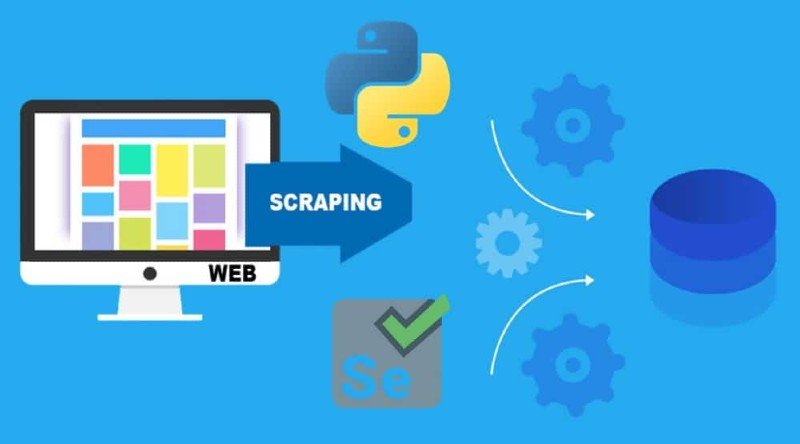How To Do Web Scraping Using Python
What is web scraping using Python, and how can it benefit your business? Let’s explore the different benefits and how to successfully execute.
Web scraping with Python allows you to extract data from websites easily. The process is very simple; you just need to write a few lines of code to scrape web pages. As a result, you can effortlessly collect valuable insights. This post will find the details of web scraping using Python. Let’s dive in.
What Is Web Scraping?
Web scraping refers to the process of extracting data from sites. It allows you to obtain large amounts of information quickly. You can utilize the data to discover key insights. For example, you can scrape the product prices from competitor websites. Later, you can analyze the data to strategically position your items on the market. It helps you gain a competitive advantage. Hence, you can boost your revenue and grow your business.
Read: What Is Web Scraping And How To Do It?
Why Should You Do Web Scraping Using Python?
Web scraping using Python enables you to extract key information from websites easily. It provides you with several big advantages.
Monitor Competitor Pricing
Today’s market is very competitive. To survive the intense competition, you need to monitor the pricing of your competitors. It will help you to effectively position your product in the market. However, it’s impossible to manually keep track of the pricing. It keeps changing all the time. By performing web scraping using Python, you can automate the process of extracting the data. As a result, you can monitor the pricing strategies of your competitors with minimal effort.
Effectively Monitor Customer Sentiment
Tracking customer sentiment is important for the success of your business. By analyzing it, you can understand the expectations and reactions of users to your products. You can track the sentiment through consumer feedback and reviews. However, performing all the analysis manually is time-consuming. It is not feasible. By performing web scraping using Python, you can quickly extract and analyze all the reviews. As a result, you can effectively monitor customer sentiment.
Aggregate News Articles
News articles are very important in the field of finance and insurance. They provide you with key insights for investments. However, you cannot read all the news articles one by one, and it will take a lot of time. Web scraping using Python allows you to extract valuable inputs from different stories quickly. As a result, you can effortlessly gain actionable investment insights.
Train Machine Learning Models With Quality Data
Machine Learning (ML) technology learns and improves on its own, and doesn’t require explicit programming. By utilizing the data online, you can train ML models to automate tasks like classification, clustering, attribution, etc. However, you need quality data to ensure the best performance. You can extract the right information from reliable sources by web scraping using Python. Therefore, you can make quality data available to the ML models. It enables you to get the best performance and results.
Cost-Effectively Generate Leads
Many companies spend a lot of money on generating outbound leads, which could burn a budget hole. In this case, web scraping comes into play. It doesn’t require you to spend a massive amount of money. Instead, it allows you to extract valuable data from reliable sources cost-effectively. As a result, you can generate quality leads without spending much money.
Is Web Scraping Legal?
Web scraping is legal if you extract publicly available data. However, some kinds of data are protected by international regulations, and they are illegal for web scraping. That’s why you need to be very careful in scraping intellectual property and confidential data. Make sure to respect the policy of your target websites. It will help you stay out of legal issues.
Read: Is Web Scraping Legal? What You Need To Know
How Can You Do Web Scraping Using Python?
There are different ways of web scraping with Python. For instance, you can use Python Packages, like Beautiful Soup, to process and extract data from HTML. However, the best way is to use a web scraper API, like Zenscrape. It allows you to collect data from sites without getting blocked, and is robust and super-fast. Also, Zenscrape is very user-friendly, and you can use it to extract large amounts of data effortlessly. Some of the benefits and features of Zenscrape are:
- Delivers lightning-fast response time
- Very easy to implement into web applications
- Utilizes a huge proxy pool with millions of IPs
- Supports an extensive request builder for converting your requests into production-ready code snippets
- Provides comprehensive documentation
Read: It’s Actually Pretty Easy To Become A Web Scraper
Using Zenscrape
- First, you have to import the requests module.
import requests
- Next, create a new variable called headers. Include your API key.
headers = {
“apikey”: “YOUR-APIKEY”}
- Then create another variable, called params. It will contain different parameters, including URL, country, premium, and render.
params = (
(“url”,”https://httpbin.org/ip”),
(“premium”,”true”),
(“country”,”de”),
(“render”,”true”),
);
- Next, create a new variable called response. It will store the response of the API.
response = requests.get(‘https://app.zenscrape.com/api/v1/get’, headers=headers, params=params);
- Finally, you can print the response of API with this code:
print(response.text)
Is Zenscrape really the best web scraper API on the market?
Zenscrape is a powerful API offering lightning-fast response time. It supports a vast proxy pool with millions of IPs. Hence, it can withstand large web scraping projects. Also, Zenscrape offers several key features, including automatic proxy rotation and JavaScript rendering. Besides, it is very easy to use. It has made the process of web scraping using Python very simple. On top of that, Zenscrape offers user-friendly documentation and generous pricing plans. As a result, Zenscrape has become the best web scraper API on the market.

